- Home
- Hammond Innes
Medusa Page 13
Medusa Read online
Page 13
I took down two glasses, and when I had poured the drinks, we stood there, not saying anything, just drinking in silence. And all the time I was conscious of her staring at me, her dark eyes big and round, the question she dared not ask on the tip of her tongue. In the end all she said was, ‘Your passport wouldn’t be any use, they’ll be watching the airport, the ferry terminal –’
‘They know who did it,’ I told her.
‘Who?’
‘A Spaniard. He left immediately afterwards – by plane.’
‘Then why –’
‘I knew him, at Bisley.’
She turned to glance at the cups, then gulped down the rest of her martini, her eyes very wide and fixed on me. The weapon then? Where is it?’ Her face had a pallid, frightened look.
I gave a little shrug. The closeness that had once been between us was gone now and I was no longer willing to share my thoughts and actions with her the way I had. It wasn’t that I didn’t trust her. It was just that the links that had bound us close were no longer strong enough, so that I felt instinctively it was best for her not to know what I had done with the gun, or even that I had found it hidden on board.
‘So you’ll be taking the boat yourself.’ She was still staring at me, holding herself very stiff, her small body almost quivering with tension.
I hadn’t made up my mind, and the way she said it I knew what she must be thinking. But I wouldn’t be running away from anything, only giving myself time and room for manoeuvre. The boat was just about ready, and in Malta I could probably produce some reasonable excuse for being without a passport.
‘I’m right, aren’t I? You’ll go with the boat to Malta.’ She had put the dog down, holding her glass tight with both hands and gazing out across the water.
‘Perhaps,’ I murmured. I can remember the way I said it, flatly, without feeling, and looking back on it now, I realised it wasn’t fear of arrest that was driving me to get away on my own for a time. Even if Menendez did decide to accuse me of smuggling arms, the knowledge that I was completely innocent made me certain Martin Lopez would be able to sort the whole thing out, given time. No, it was Soo. If she had slept with the man, had an affair with him, that was something I could have lived with. But love, a real passion – that is something that strikes at the heart of a man. It leaves him nothing – nothing to strive for, no purpose. Both pride and practicality dictated a break.
‘Are any of the people you knew still there? Have you kept in touch?’
I shook my head. ‘Mintoff and the new man will have made it impossible for them.’
‘There’s my mother’s relatives.’
‘Your mother hasn’t been back since your father retired.’ I took her glass and refilled it, then mixed some more and went back to the window. Flurries of an onshore breeze were darkening the water. This was the view I had looked out on ever since we had married and settled down to build a business on this island.
‘Gareth might be useful.’ She said it tentatively.
‘How do you mean?’
‘In addition to showing the flag in the Balearics and one or two of the Italian islands, he thought it possible Malta would be included in his orders. He asked if I had any messages.’
‘Did he say when he was leaving Gib?’
‘No. His letter was written the day after he went on board. There was no mention of his having received orders, only that he looked forward to seeing us again when Medusa visited Mahon.’
‘Wade may know his movements.’ I stood there, sipping my martini, staring out of the window and thinking about the future. Malta was over six hundred miles away and even if we averaged ten knots, which was just possible with a favourable wind, it would take us the better part of three days.
We didn’t say much after that, our thoughts locked in on ourselves, and as the shadows lengthened and six o’clock approached, I asked her to leave me so that I could talk to Wade on my own. I remember I shut the door behind her and in doing so it seemed as though I was shutting myself out from the past.
Wade was late. Only a few minutes, but expecting him to come through prompt at 18.00, waiting, it seemed an age. The sound of the phone when it came was startlingly loud, his voice even more upper-class English, more clipped than when he had phoned me in the early hours. ‘Wade here. Did you locate him?’
‘Yes.’ And I told him where Evans was and how he had been having a meal in the Taberna Felipe on the Ciudadela waterfront at the time of the shooting. ‘He couldn’t have done it,’ I said.
‘Of course not.’ And he added, ‘Yesterday the Spanish police asked Interpol to locate an Italian from Naples who was booked out of Menorca on two consecutive flights, the first to Mallorca, the second to Barcelona. The name on his passport, which was forged of course, was given as Alfredo Geronimo. In fact, they now discover he is Spanish and his real name is Antonio Barriago. I believe you know him.’
‘I’ve met him,’ I said cautiously. ‘Three years ago.’
‘You fired together in the finals for the Oporto Cup. Had you met him before that?’
‘Once,’ I said. ‘When I was shooting in Spain.’
‘He wasn’t one of the men with you when Ahmed Bey was killed?’
‘No.’
‘Or on the Italian boat?’
‘Not as far as I know.’
‘The police in Mahon seem to think the connection is a lot closer than just competition shooting. They’ve asked both Interpol and the Yard people over here for all the information they have on you, a dossier in fact. You and Barriago.’
‘And Evans?’ I asked. ‘What about Evans?’
‘I don’t think so.’
‘He’s involved,’ I said. ‘I’m sure of it.’
‘Why? You say he was at Ciudadela.’ His voice was sharper now. ‘What makes you think he’s involved?’
But I was already regretting my attempt to involve Evans so directly. ‘I just feel it,’ I answered rather lamely, wondering how my words would be interpreted when they searched the villa and found the gun. ‘Lloyd Jones,’ I said. ‘Where does he fit in? He came out here with a picture of Evans in his pocket.’ I was remembering what Carp had told me, that odd incident on the East Coast of England. ‘He said he was on leave, a holiday before taking up his new appointment. But his sole object seemed to be to find Evans. Why?’ There was no answer. ‘Are you still there?’
‘Yes.’ And then he said, ‘They were at HMS Ganges together, almost the last batch of youngsters to go through before the school was closed.’
‘I know that. But they are related in some way.’
‘Who told you that?’
‘My wife.’ And I added, ‘Is it true? Are they related?’
I thought he wasn’t going to answer that, but then he said, ‘They both have the same father. No reason you shouldn’t know that.’
‘But why send him to me?’ I asked. ‘He said it was at your suggestion he was contacting me.’
‘Not my suggestion. Philip Turner’s. He put us on to you.’ And he added, with something near to a smile in his voice, ‘When we checked your background, it was obvious you were just the man we were looking for. Malta, Menorca, Gibraltar, you know them all – all the Western Med, that is.’
He was covering himself. Phones are funny things, very revealing. You pick up nuances of expression, the hint of hidden meanings. I had the sudden sense of a void opening up, certain he had let something slip, that he hadn’t meant to be so specific. ‘I’ll be in Malta a week from now,’ I said.
‘Malta. Why?’ And when I told him I had a charter fixed for the catamaran, he said, ‘I know that, but you can send somebody else. There are things I want to know and you’re the man who can tell me. The new mayor, for instance. Who is it going to be? Who are they going to elect?’
‘I’ve no idea.’
‘Well, find out for me, will you?’ And when I told him I wouldn’t have time, that I needed to get away tomorrow night, he said, ‘What’s the hurry? Has
something happened I don’t know about?’ I told him then how the police had searched the office and my home, then rummaged the boat. ‘Are you under house arrest?’
‘No, but they took my passport.’
‘Under surveillance?’
‘I don’t think so.’
‘But they suspect you?’
‘How can they?’ I said. ‘I was sitting there in full view when it happened.’
‘Yes, but the gun. I take it they haven’t found it yet.’ And he added, ‘You see, they don’t know how Barriago came by it. He couldn’t have entered Menorca with the thing tucked under his arm. And what did he do with it afterwards? Do you know?’
‘Of course not.’
He didn’t say anything then, and I wondered whether he believed me.
‘Has Lloyd Jones left Gib yet?’ I asked him.
‘I can’t answer that.’ And when I persisted, he said he was not privy to the detailed movements of ships. That was when I asked him what department of the Navy he was. He hesitated before answering. ‘Planning. Forward Planning.’
‘Then perhaps you can tell me if Medusa will be putting in to Malta.’
‘I think she may.’
‘Before or after she visits Mahon?’
‘Before probably.’ And then he asked me what my eta Grand Harbour would be. ‘You’re leaving tomorrow, you say?’
‘No, not tomorrow.’ I couldn’t do that. I couldn’t just sail out of the port here and head straight for Malta, it’ll have to be the early hours of the following day,’ I said. Carp could motor the catamaran round to Es Grau, or Port d’Addaia, one of the smaller inlets, then we could slip out when everyone was asleep.
‘And your eta?’ he asked again.
‘Five days from now,’ I said, if we’re lucky and the weather holds.’
‘I see.’ He seemed to be thinking something out. Then to my surprise he said, ‘Well, good luck!’ He said it in quite a cheerful, friendly voice, and with that he rang off.
II
Malta Incident
Chapter One
The weather, in fact, did not hold. Carp had the boat ready for sea well before noon, he and Luis motoring her across to the commercial quay where they took on fuel and water, cleared customs and immigration, and loaded the fresh stores Soo had ordered, also the last-minute purchases. They were away by 14.30. By then it was blowing force four from just north of east, the wind funnelling up the harbour so that they were motor-sailing with jib and main hard in.
I was there to see them off. I had spent most of the morning talking to people on the phone, chiefly the foreign element, those who had established themselves in business and were permanently resident. Some of them, of course, like myself, had not involved themselves in the political life of the island. But even they were beginning to get worried. Those with Spanish connections were more deeply concerned and Fuxá’s name constantly cropped up. Others were mentioned, of course – one of the leading PSOE figures, in particular – but it was Ismail Fuxá who really scared them. Most regarded his separatist, anti-foreign movement as having grown alarmingly in recent months, some even thought he might have enough support in council to get himself elected as the new alcalde.
Only one of them was willing to talk about it openly and at length. That was Freddie McManus, a retired property developer who had once stood as Conservative candidate for some Scottish constituency. He pointed out to me that however the 1978 constitution might try to safeguard the powers of the central government, the establishment of the Balearics as one of the seventeen independent provinces meant in practice that the potential power of the locally elected alcaldes was greatly increased. ‘It’s a charter for the emergence of little Gauleiters. All that’s required is a dominant personality. And if the man has a cause, then he’s even more dangerous.’ And he had gone on to point out to me that to islanders stuck out on the eastern fringe of a small group in the Western Mediterranean, Madrid was a long way away. Also, and he had emphasised this very strongly, the power of the alcalde was rooted in the history of Spain, when in 1485 Queen Isabella struck at the nobility through the Ordenancas Reales with a court of two alcaldes to administer justice in every town of thirty or more inhabitants. ‘Given a weak governor in Palma,’ he said, ‘anything could happen if that man Fuxá became Jorge Martinez’s successor.’
None of the others I talked to were as forthcoming as that and quite a few were unwilling to discuss the political situation with me at all, some making it clear in the nicest possible way that they wanted to distance themselves from me, others quite blunt about it. There was, of course, an element of guilt involved. An island the size of Malta with a third of its wildest rock coast blanketed by villa and hotel development is not a pretty sight and most of us were getting our living from the urbanizacións in one form or another. It wasn’t as bad as Benidorm or Tenerife, but to those with a conservationist conscience it still left a nasty taste in the mouth, bearing in mind how unspoilt Menorca had been before.
I must have contacted between twenty and thirty people that morning, all men who had as much to lose as I had if the political stability of the island was destroyed, and by the time I drove round to the commercial quay to check that Carp was cleared and ready to sail, my mind was made up. Tongues were wagging, and if I stayed, I might well find myself the scapegoat for what had happened. I was lucky to be free at the moment. If I hadn’t got up at first light the previous day and searched the ship I would undoubtedly be under interrogation at Guardia headquarters, perhaps even flown off to mainland Spain. I had talked it over with Carp late that night. He knew what to do and the deterioration in the weather would make it all the more convincing that he had to put back into the nearest shelter to clear a warp wrapped round one of the prop shafts or deal with some water in the fuel tank. The probability was that nobody would bother to report the cat in Addaia, but if they did, then he had any number of good excuses.
The Policia Municipal building looks right down on to the commercial quay, so that I was not surprised when a police car with two officers in it drew up on the quayside. We were just taking the last of the fresh stores on board and they parked there, watching us. If I had not come ashore when Luis uncleated the stern warp preparatory to letting go, they would have been on the radio immediately for a harbour launch, which would have stopped us before we had even reached Bloody Island.
I watched from the quay as Luis coiled down the stern warp, then ran for’ard to hoist the jib. The mains’l was already set and flapping on a loose sheet as the engines took her out into the open waters of the harbour and Carp turned her into the wind, heading east to clear the old grassed-over fort on Figuera Point at the entrance to the harbour proper. She looked a lovely sight once the sails had been hauled in tight, a rather hazy sun glinting on the new paint of the hull and transforming the twin bow waves into silver glitters of spray.
I turned then, thinking as I walked back to my car that I might catch up with them before they cleared the point. But then the police car cruised up alongside, ‘You are not going with them?’ It was Inspector Molina, and he was smiling at me. ‘Such a nice boat. It must be very tempting. And Malta. Your wife comes from Malta.’
He was still smiling as I said, ‘Yes, I would have enjoyed the trip. But you have my passport.’
‘Ah si, and you are a law-abiding citizen of our island.’ And he added, They can see your boat is preparing to sail from up there.’ He nodded in the direction of the citadel with the slip road snaking up like a staircase with two hairpin bends in it. ‘I just come to make sure.’
It was on the tip of my tongue then to tell him he would have been better employed searching the Santa Maria and the villa on Punta Codolar, but I checked myself. Sooner or later it was surely inevitable they would find the gun where I had hidden it. ‘Adiós.’ They drove off and I went back to the office to ring Lopescado at the Taberna Felipe in Ciudadela. The Santa Maria had left.
‘When?’
But he didn’t
know. Sometime during the night, he said, for it had been there the previous evening. In fact, all three of them had come ashore about eight o’clock. They had sat around outside and had a few drinks, then they had gone into the fish bar for a meal. They had left about ten-thirty and gone straight back to the ship.
‘All of them?’ I asked.
‘Yes, all of them, and the boat is still there when I go to bed, with a light shining in the wheelhouse aft as well as a riding light at the forestay.’
‘Did you gather where they were going? Did they clear customs, anything like that?’
‘No, I never saw any official go on board, not then, nor any time earlier during the evening. But then I was very busy last night, a beeg party from Banyos, a German party …’ He hesitated, then said, ‘Once, when I am serving the next table, I hear your name mentioned. It was something about the policia. They were arguing about why some information had not been acted on. The last I hear they think you will try to leave Mahon sometime today. No, you will have to leave. Those were his words.’
‘Whose words?’ I asked. ‘Was it Evans who said that?’
‘Si. The boss man with the Guevara moustache. Pat Eevanz.’
He couldn’t tell me anything more and when I put the phone down I sat there at the desk for a moment, gazing out towards La Mola and the Mahon entrance four miles away and wondering where the Santa Maria was now, what Evans was up to. I could just see Thunderflash, her white hulls and sails outlined against the hazy shape of Lazareto Island. Once they were clear of Punta del Esperó, the easternmost tip of La Mola, they would have a beam wind and a fast run to Cape Faváritx, then only five miles and all downhill to Macaret at the entrance to Port d’Addaia. Perhaps I should have arranged for them to put into Es Grau, but the entrance was very narrow and overlooked by almost every house in the little fishing village. In any case, I hadn’t known then that Evans had sailed, and even if he did intend to spend the night at the villa on Punta Codolar he would probably anchor the Santa Maria in Arenal d’en Castell. It would be very sheltered there in an easterly blow. A picture flashed through my mind then of him opening a can of beer, or sitting down to a quick meal, at the table in that kitchen with the gun he thought was still on board the catamaran right there under the floorboards at his feet.

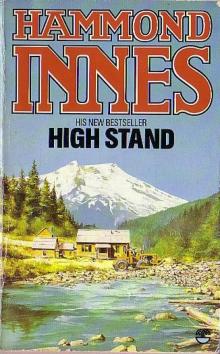 High Stand
High Stand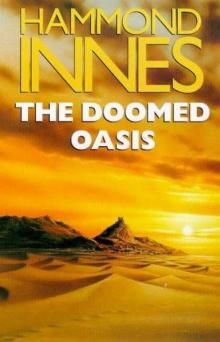 The Doomed Oasis
The Doomed Oasis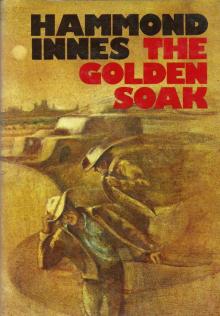 Golden Soak
Golden Soak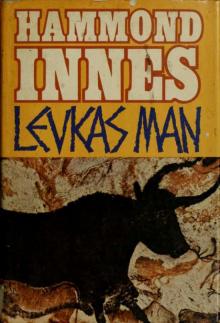 Levkas Man (Mystery)
Levkas Man (Mystery)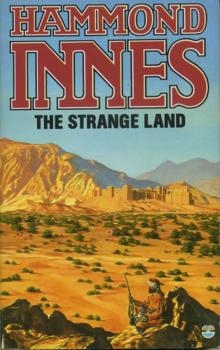 The Strange Land
The Strange Land Dead and Alive
Dead and Alive Attack Alarm
Attack Alarm The Strode Venturer
The Strode Venturer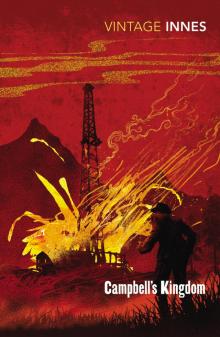 Campbell's Kingdom
Campbell's Kingdom North Star
North Star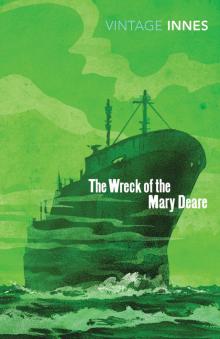 The Wreck of the Mary Deare
The Wreck of the Mary Deare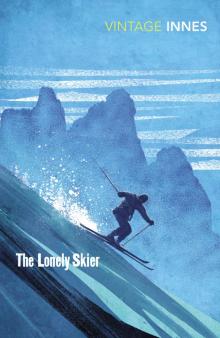 The Lonely Skier
The Lonely Skier The Black Tide
The Black Tide The Trojan Horse
The Trojan Horse Medusa
Medusa Air Bridge
Air Bridge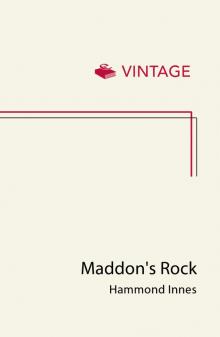 Maddon's Rock
Maddon's Rock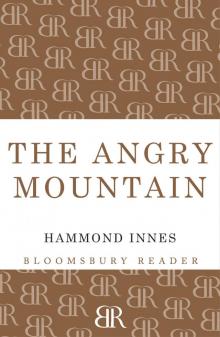 The Angry Mountain
The Angry Mountain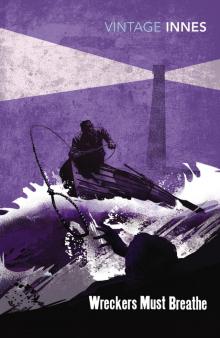 Wreckers Must Breathe
Wreckers Must Breathe Solomons Seal
Solomons Seal The White South
The White South